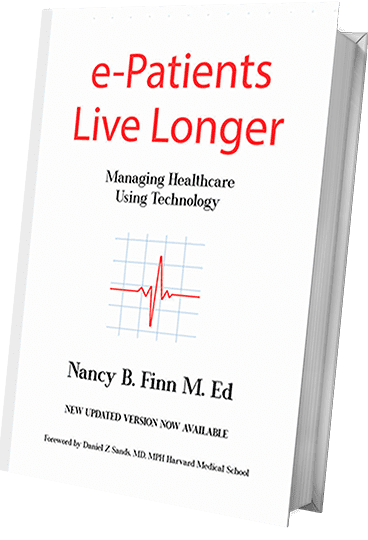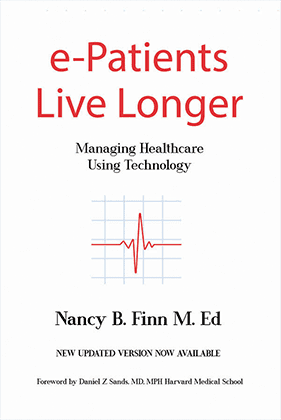Service Area : USA
Nancy B. Finn Presents
Navigating the Future of Healthcare: Your Roadmap to e-Patient Success
Learn MorePurchaseReviews
Illuminating Books Digital Tools for Healthcare & More
Nancy B. Finn is passionate about utilizing tech to empower and engage patients and ultimately achieve better outcomes. Her healthcare publications, e-Patients Live Longer and Digital Communication in Medical Practice offer valuable insight into how doctors, other providers, and administrators can utilize technology for more efficient and higher-quality care. She has also written about technology and communication in the office setting. Explore this site to learn more about these texts, and contact Nancy with any questions.
Nancy B. Finn
Nancy B. Finn is a journalist, author, and digital health thought leader. She wrote the updated edition of e-Patients Live Longer that helps patients understand how a simple digital tools for healthcare can optimize their health and experiences with providers. She aims to offer well-researched and thought-provoking content about healthcare and how people can monitor chronic conditions for better outcomes.
In addition to her work as a technology and healthcare journalist, she is the founder and president of Communication Resources, a consulting organization. Communication Resources offers advice and training workshops on managing patient information and transitioning to patient-centered care. Learn more about Nancy and her expertise here.

Testimonials
Testimonials
Recent Blogs
Artificial Intelligence Penetrates Healthcare in 2025
The healthcare system in 2025 in the United State is facing multiple challenges including: a mandate for reducing cost of care throughout the system, protecting against cybersecurity threats, maintaining a viable workforce, instituting health equity and implementing responsible artificial intelligence technology.
Early adopters are already using AI to bring efficiency to healthcare systems operations. In 2025 retraining the workforce, across the board from administrative workers to clinical providers must be included in strategic plans and budgets, so that healthcare professionals will understand how to be more effective using AI to make clinical determinations and engage their patients. Using AI to assist in care delivery, and clinical and patient monitoring requires serious oversight that includes ethical considerations to prevent bias. Additionally, scaling AI across the healthcare landscape will require careful data governance to ensure data quality and transparency that will foster trust among the many healthcare stakeholders from administrators to clinicians to patients.
There are certain priorities to consider when implementing AI. They include:
Responsible AI adoption that has an underlying infrastructure of strong governance frameworks that prioritizes ethical use and prevents bias and errors.
Measurable Benefits that are analyzed and evaluated by the key personnel as you move ahead in the areas of:
operational efficiency,
customer service,
clinical support.
Ensuring that AI is enhancing and NOT replacing human decision making and input, and there is robust human oversight. AI’s role is to assist by processing large datasets and providing insights, enabling healthcare professionals to have the information they need to focus on patient care.
Budgeting time and funds for retraining the healthcare workforce and building trust. When healthcare professionals understand how AI works, and its role as a supportive tool that complements their expertise, rather than as a potential replacement, the long-term viability of this technology will be reinforced.
The New Year will see the introduction of innovative AI-based medical applications and devices, as well as various iterations of robots and online analytical tools, all targeted to improving care an enabling better communication with patients. It will not resolve, but will help to analyze, the complex issues involved in the cost of care and in problems of equity and cybersecurity that remain challenges going forward. However, with proper focus, we will advance. hopefully in a good way for a good year.
THE FUTURE OF HEALTHCARE 2025 West Monroe, a global business and technology consulting firm. Erik Brown, Senior Partner, Technology & Experience, Cameron Cross Partner, Technology & Experience January, 2025
Wading Through the Difficult Maze of Health Insurance
The recent killing of the United Health Chief Executive Officer by a distraught youth who had been refused reimbursement for needed care, brought to light the inequities and inefficiencies of our health system and what happens when some patients fall ill or are injured.
Health insurance is a contract where individuals pay a monthly fee, called a premium, to an insurance company in exchange for the company covering a portion of medical costs when they get sick or injured. Like any insurance, health insurance is supposed to protect the individual from large, unexpected healthcare bills by sharing the financial burden across a group of people, known as a “risk pool.”
A study by KFF in 2023 found that roughly 6 in 10 insured adults experience problems when they use their insurance. Problems studied include denied claims, network adequacy issues, preauthorization delays and denials, and others. The KFF Survey of Consumer Experiences with Health Insurance found that 18% of insured adults say they experienced denied claims in the past year. This problem was somewhat more common among people with employer-sponsored insurance (21%) and marketplace insurance (20%), less so among people with Medicare (10%) or Medicaid (12%).
There are a variety of reasons a claim might not be approved:
-
It might not be covered by your insurance in the first place.
-
It might not be considered medically necessary.
-
You may have a clause in your policy that says you need to get prior authorization.
-
Your physician wasn’t in the insurer’s network.
Consumer Survey Highlights Problems with Denied Health Insurance Claims
Karen Pollitz, Kaye Pestaina, Lunna Lopes, Rayna Wallace, and Justin Lo
Published: Sep 29, 2023
Americans increasingly struggle to find the right health insurance that works for them. High deductibles and copayments are causing nearly two out of five working-age adults to delay visiting the doctor and filling prescriptions. Those who do get care can become burdened by medical or dental debt, something almost one-third of working-age adults report experiencing. Billing errors and denials of coverage by insurance companies clearly contribute to this problem. Payors are becoming increasingly adept in using technology to deny payment of medical claims and they pressure the physicians of their corporate clients to deny care during prior authorization reviews. Doctors also report spending increasing amounts of time on the phone with insurance company physicians over denials of care for their patients.\
Findings from a Commonwealth Fund survey conducted by using SSRS, which stands for “SQL Server Reporting Services,”. included 7,873 working-age adults, between the ages of 19 and 65, who were insured at the time of the survey. The findings revealed that a high percentage of these individuals reported their insurance provider charged for a health service they thought should have been free or covered and several reported that they were denied coverage for care recommended by their doctors. The study examined whether or not people challenged such errors or coverage denials, the reasons why they didn’t, and the implications for their health and well-being. People were grouped by the coverage source they reported at the time of the survey, such as employer or individual market or marketplace.
Highlights of the findings:
-
Forty-five percent of the insured, working-age adults reported receiving a medical bill or being charged a copayment in the past year for a service they thought should have been free or covered by their insurance.
-
Less than half of those reporting billing errors said they challenged them. Lack of awareness about their right to challenge a bill was the most common reason, particularly among younger people and those with low income.
-
Nearly two of five respondents who challenged their bill said that it was ultimately reduced or eliminated by their insurer.
-
Seventeen percent of respondents said that their insurer denied coverage for care that was recommended by their doctor; more than half said that neither they nor their doctor challenged the denial.
-
Nearly six of 10 adults who experienced a coverage denial said their care was delayed as a result.
Of the respondents who thought they had received a bill in error, fewer than half attempted to challenge the bill. People with marketplace or individual market plans challenged these bills at a rate lower than those covered by Medicaid or Medicare (the difference was not statistically significant). This is despite the ACA’s requirement for insurers to have systems in place for consumers to appeal and challenge their bills. There were no significant differences by race and ethnicity or poverty level.
Unforeseen Health Care Bills and Coverage Denials by Health Insurers in the U.S. Avni Gupta, Sara R. Collins, Shreya Roy, Relebohile Masitha The Commonwealth Fund, 2023
Consumers do have options if their health insurance claim is denied, although a denial can threaten their financial security and ability to access medical care because most Americans access health care through health plans. Many companies offer health insurance as part of their benefits packages. Low-income Americans or the self-employed can get insurance through the Affordable Care Act (ACA).Health insurance companies offer plans on the federal exchange, and consumers can purchase an appropriate plan.
A few common reasons for health insurance claim denials include:
-
Services or procedures not covered by the policy.
-
The procedure is considered experimental, cosmetic, investigational, or not medically necessary.
-
A referral or pre-authorization was required.
-
The consumer used an out-of-network provider.
-
Typographical errors.
-
Timeliness.
-
Policy limitations.
Whatever the health insurer’s decision, consumers have rights. They have a right to an internal appeal and an external review if necessary. If their state has a consumer assistance program, the program can file an appeal for the consumer. Consumer assistance programs help consumers within their state with any health insurance issues.
There is no question that the whole issue of choosing an appropriate health plan each year, understanding the health insurer’s policy, and dealing with a denied claim when you are ill or injured and not up to the task is daunting and almost impossible for many people. There is no question that the health system we have in the U.S. is dysfunctional and works in favor of the huge companies that have a large staff who determine policy, interpret the current regulations, and protect their bottom line. Part of the solution is that patients, need to better understand their health insurance policy when they sign up; physicians need greater respect from the insurers when they recommend treatments and procedures for their patients.
Digital Technology Changes Healthcare for Patients and Physicians
The widespread adoption and use of digital health is opening new and innovative ways to improve health and health care delivery. Digital health is shifting the patient role from a passive recipient of care to an active participant who has greater control and responsibility for managing their health .and gaining access to high-quality, personalized care. Digital health tools can tailor treatment plans based on individual patient data, to more targeted and effective care, including self-management of chronic conditions. It provides easy access to educational resources, utilities for setting health goals, and tracking progress. By having access to their health data, patients can be more involved in discussions with their doctors about treatment options. Patient portals, online platforms where patients can view their medical records, schedule appointments, and communicate with providers, and mobile applications such as medication reminders
fitness trackers, smartwatches, and other devices that monitor vital signs and activity levels, change the way healthcare is perceived, practiced and delivered. With telehealth, virtual consultations between patients and healthcare providers through video conferencing, adds another dimension, enabling patients to seek answers to questions without getting into a car or public transportation for a face -to-face visit with their clinician.
The introduction of electronic health records (EHRs), digital versions of patients’ medical charts, now offer real-time information about medical histories. EHRs can also be shared in a variety of ways among clinical decision-makers, from diverse locations, allowing them to easily track health data over time, monitor patients’ conditions and improve healthcare quality. EHRs also enable patient information to be shared among a variety of providers who may be in many diverse locations and institutions. For example, a patient can get a CT scan from their local community hospital, and, on the advice of their PCP, can then go to a major academic teaching center where their diagnostic images can be reviewed digitally.
Digital Health has also changed the work routines of the physician who now must spend hours every day wrestling with long loading times to view clinical data and analyze a litany of structured data sets to address medical billing requirements for innumerable insurance companies. Physicians also must deal with a nearly endless sea of protected health information on their individual patients. Digital health is so overwhelming, that many physicians are leaving the field. This causes a problem for everyone. It is predicted that by the end of this year, the United States is expected to have a shortage of up to 64,000 physicians.1 That is projected to grow to 86,000 by 2036.
Physicians shed light on the factors that are pushing them out of the workforce and the changes that could make them stay. McKinsey and Company, Laura Medford-Davis and Rupal Malani with Chelsea Snipes and Pieter Du Plessis)
Digital health is transforming how medical professionals provide care, what patients do to receive it, and how health care systems operate. On the positive side, it fosters changes that introduce new therapies and new best practices for better health management and enables massive amounts of data to be collected and analyzed to help improve patient well-being, enable the interchange of information, encourage communication and reduce the cost of care. On the negative side it is impacting the work flow for clinicians, making it almost impossible for them to do the work of healing the patient that should be their key mandate.
Artificial Intelligence Penetrates Healthcare in 2025
The healthcare system in 2025 in the United State is facing multiple challenges including: a mandate for reducing cost of…Digital Technology Changes Healthcare for Patients and Physicians
The widespread adoption and use of digital health is opening new and innovative ways to improve health and health care…
Contact Form

Available at:








